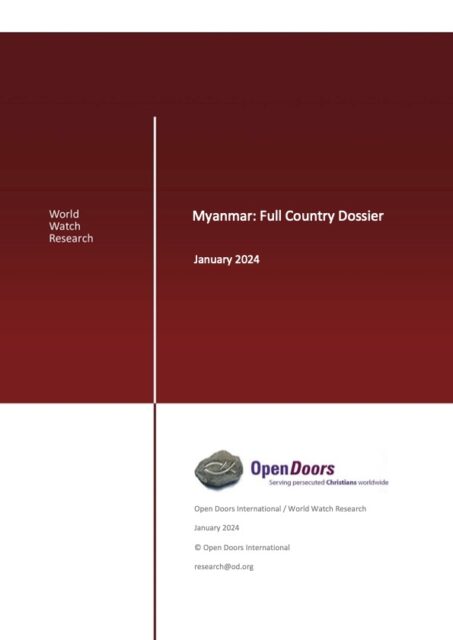Myanmar: Full Country Dossier
25 January 2024

Brief description of the persecution situation
As 2024 sees Myanmar entering a fourth year of an increasingly violent conflict, solutions – or even just a ceasefire – are nowhere in sight. After the army staged a coup on 1 February 2021, fighting has continued and increased in many parts of the country; with the levels of violence rising, the Christian minority is among those bearing the brunt of attacks. Even well-established churches belonging to historical Christian communities are being attacked in predominantly Christian states like Chin, Kachin and Kayah states, but also in states with a strong Christian minority, like Karen state and northern Shan state. More Christians than ever have been driven out to live in IDP camps, take refuge in churches or even flee to the jungle where they are often deprived of access to food and healthcare. Since the beginning of the civil war, an estimated 1.5 million citizens of Myanmar have become IDPs. Christians are part of the generally peaceful resistance movement, but fighting has increased across the country and although not all ethnic minority armed groups are involved, some Christian ones are, even those that have been out of the spotlight for a considerable time, like the Karen. Government forces continued to attack Christian villages and churches (while leaving Buddhist monasteries largely untouched) and also killed Christian aid workers and pastors. An aerial attack against a concert held in celebration of the foundation of the Kachin Independent Organization in October 2022 killed more than 60 people, highlighting the increase in the level of violence in the conflict (Al-Jazeera, 24 October 2022).
Converts to Christianity find themselves additionally persecuted by their Buddhist, Muslim or tribal families and communities because they have left their former faith and have thereby removed themselves from community life. Communities who aim to stay “Buddhist only” make life for Christian families impossible by not allowing them to use community water resources. Non-traditional church groups experience opposition too, especially when they are located in the rural areas of Myanmar and/or are known for proselytizing. While Buddhist monks are somewhat divided concerning the February 2021 coup, many of the more radical ones support it.
Announcements
28 February 2025
Asian NGO Network on National Human Rights Institutions , CSO Working Group on Independent National Human Rights Institution (Burma/Myanmar)
Open letter: Removal of the membership of the dis-accredited Myanmar National Human Rights Commission from the Southeast Asia National Human Rights Institution Forum

Progressive Voice is a participatory rights-based policy research and advocacy organization rooted in civil society, that maintains strong networks and relationships with grassroots organizations and community-based organizations throughout Myanmar. It acts as a bridge to the international community and international policymakers by amplifying voices from the ground, and advocating for a rights-based policy narrative.
